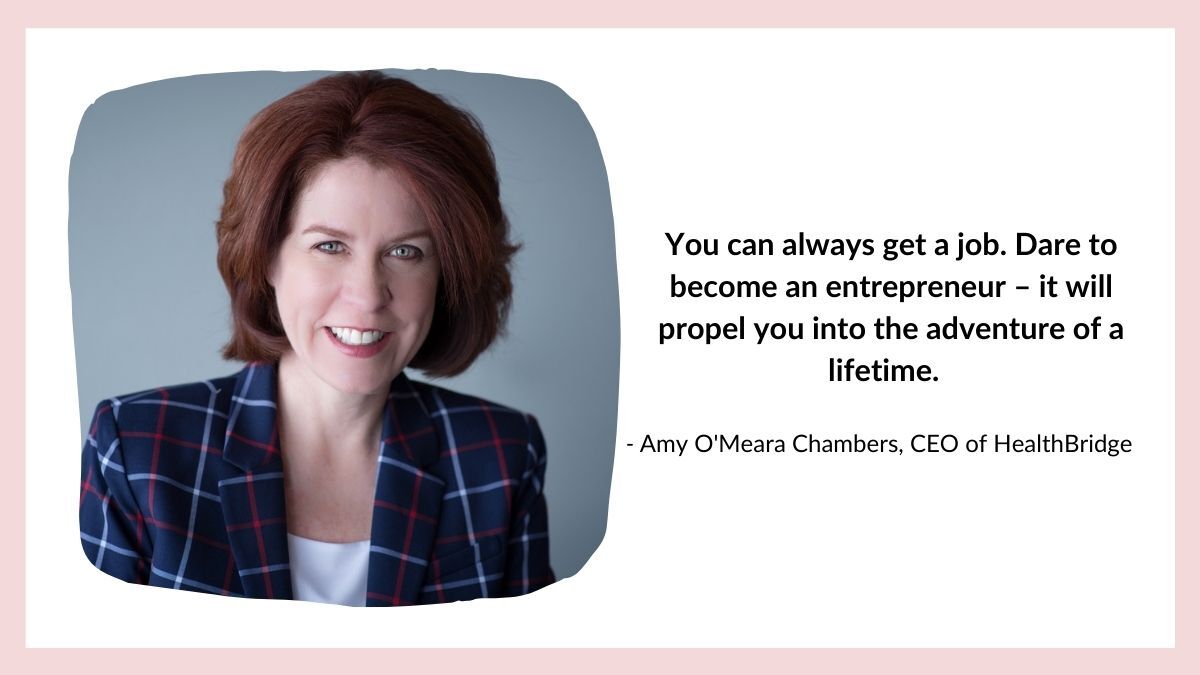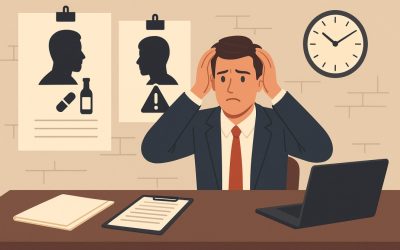Being consumed by the hype around entrepreneurs who build multi-million companies by the time they are thirty, we often discredit the success of entrepreneurs who started at a later stage of their lives. For what it’s worth, entrepreneurs who started their ventures with a few silver hairs on their head carry more evergreen business wisdom.
Such is the case with Amy O’Meara Chambers, the co-founder and COO of HealthBridge, a solution that removes the financial insecurity that comes with health plans in the US. It took her 20 years of working for others to finally put her entrepreneurial mind (inherited from her father) and avid experience to good use.
Here’s an entrepreneurial story that’s not about making quick money and “fake it ‘till you make it”.
Feeling under-appreciated as an employee, a nonexistent work-life balance, financial struggles, getting out of bad relationships – these are the most common triggers that push women to become entrepreneurs. Tell us about your trigger?
I experienced almost all the above prior to becoming an entrepreneur, so these were contributory factors. But the real trigger for me occurred 10 years ago when opportunity met with long-harbored desire. I had wanted to be an entrepreneur for a long time but feared the financial instability. My father was an entrepreneur, so as a child, I watched him ride that roller coaster.
But, here I was almost 20 years into my career, financially stable, kind of tired working for other people, and full of ideas…and then the perfect invitation to be part of an interesting start-up came along. While it wasn’t the perfect start up in terms of becoming a financial success, it was the perfect start up because I learned an enormous amount, met two people who I still collaborate with today, and kick-started my entrepreneurial career. Plus, it gave me the opportunity to finally work side-by-side with my father, who died three years ago.
Great memories, and an amazing experience. Leaving the everyday working world to become an entrepreneur was the best decision that I’ve ever made.

How did you come up with your business idea?
My co-founder and I met 15 years ago when I was designing consumer-driven health plans for my health plan employer. Greg was the founder of a first-of-its kind revenue cycle company that understood what the advent of high patient out of pocket costs would mean to his provider customers. I had just written “HSA’s for Dummies” and worked down the street, so he called the main switchboard and asked to speak to me. That was a good call, because we’ve been friends ever since.
What we realized – even all those years ago – was that if these high deductible plans grew in popularity (which they have), there would be an inevitable strain on the healthcare ecosystem due to lack of patient funds. Back then, it was way too early for us to launch a solution for a problem so far into the future.
But, fast-forward a decade: we had just sold the start-up we had worked on together, and recognizing that the problem we spotted all those years back was now bigger than ever, we jumped in with both feet. Along with another colleague of ours, we kept the money we had made on our last sale on the table, and seeded HealthBridge. Four years later, we’re raising a C-Round, have 40 employees and are actively in market.
Have you had support from someone, even if just encouragement? Who was that and how did it help you?
My cofounder, Greg VandenBosch, is the most supportive partner an entrepreneur could ask for. We are on age with each other, so we are at the same stage with our families and our careers. He has always been an entrepreneur, so he’s gained a lot of wisdom along with some battle scars. It’s nice to have a partner to go through all the ups and downs that come with being a venture backed startup.
Daily support and encouragement is key, and we find that when one of us is weak, the other one musters up the courage to be strong, which keeps us moving forward, even in the toughest times.
Female entrepreneurs are often underestimated and overlooked. Have you ever felt at a disadvantage?
I am fortunate that healthcare is filled with women leaders, so when it comes to most of my meetings with healthcare stakeholders, I usually see myself reflected around the room. Because I’ve worked in the industry for so long, it is rare that I am not met with respect.
When it comes to the venture capital world, it’s the rare event when I stare into a webex and a female face stares back at me. With that said, while it may be a little more difficult to navigate the small talk that starts each pitch (I’m not sure that I’ve ever watched an entire football game and I definitely don’t fly fish), I have to say that once we start talking shop, we all just become experts in our respective areas.
Some say it’s hard work, others say it’s talent and resourcefulness that play a crucial role for success in entrepreneurship? Which traits have been instrumental for your success so far? And why?
You need to have all of the above. Plus, be a player/coach, a good presenter, a good writer, a level-headed decision-maker, be able to fix the copier, and not too proud to beg…as the song goes.
My successes to date have probably originated from the expertise that I developed in health insurance and healthcare over my first two decades as an employee benefits attorney and a product developer at a leading health plan. Nothing is better than first-hand experience. Most of what I know can’t be learned reading articles.
What excites you the most about being an entrepreneur?
I get to make peoples’ lives better. Period. That’s my ultimate goal as an entrepreneur.
Share with us some of the worst business advice you’ve ever received?
Before I jumped into start up, I spent two years at a job that I didn’t love so that I could make money while slowly transitioning into entrepreneurship. I can’t recall if anyone gave me advice to do it that way. (Most likely, I gave myself that terrible advice.) But, looking back, I should have jumped in completely. Having your attention divided between two important bodies of work is unsustainable and a recipe for failure.
You’ve got a high stake investment opportunity. Pitch your business in 150 words.
We’ve created a first-of-its-kind benefit designed to help bridge the gap between the high cost of healthcare and a person’s ability to pay for it. When a member consumes healthcare, HealthBridge covers the costs immediately on their behalf – copayment, coinsurance and deductibles. HealthBridge provides the member with a consolidated monthly statement, plus guaranteed, friendly repayment terms, giving them financial security and flexibility.
HealthBridge becomes a financial safety net, so that when patients want or need care, they can get it with confidence. Often, people will delay necessary care because they can’t afford the deductible, which has costly consequences. People stay sicker, for longer. Employers lose worker productivity and providers see their outcomes erode. By giving patients financial security alongside the health plan they select, they prevent the unhealthy ripple effect from happening. It’s a game changer. HealthBridge benefits every stakeholder —the provider, the patient, the employer, and the payer—so that everyone wins.
What’s the best piece of advice you’d give to inspire aspiring entrepreneurs?
You can always get a job. Dare to become an entrepreneur – it will propel you into the adventure of a lifetime.
What are your goals for the upcoming year?
I’m committed to 10x the size of the company and evangelize the need for financial security around patient out of pocket costs. It’s imperative for the healthcare ecosystem.
Any final words to end this interview?
How about…Is it ever too late to become an entrepreneur?
No, never. I waited 20 years, and hopefully I have another 50 doing this. Take the leap. It’s worth the risk.
More must-read stories from Enterprise League:
- Things to consider before deciding on a business location.
- These are the must-have apps you’re going to need if you’re an entrepreneur.
- Mindblowing guerrilla marketing ideas to help your business growth.
- Five ways you can expand and improve your business knowledge.
- The importance of customer-focused strategy for your business.
Related Articles
Best 1800 Number Providers In Australia
If you're operating a business in Australia, it's in your best interest to invest in the right tools to give you an advantage in your respective field. One tool that many local entrepreneurs often overlook is a business number, particularly an 1800 number. 1800...
Where to Find Affordable Election Services for Unions
Every year, thousands of labor or trade organizations across the country hold elections to choose representatives. This creates a demand for affordable election service providers that help unions manage the logistics. Election services for unions come in many...
Workplace Violence or Drug Accusations: Protecting Yourself Legally
Accusations of workplace violence or drug-related misconduct can derail a career, even when the claims are unfounded. A single allegation can lead to suspension, internal investigations, damaged professional relationships, and in serious cases, criminal charges....
Best 1800 Number Providers In Australia
If you're operating a business in Australia, it's in your best interest to invest in the right tools to give you an advantage in your respective field. One tool that many local entrepreneurs often overlook is a business number, particularly an 1800 number. 1800...
Where to Find Affordable Election Services for Unions
Every year, thousands of labor or trade organizations across the country hold elections to choose representatives. This creates a demand for affordable election service providers that help unions manage the logistics. Election services for unions come in many...






